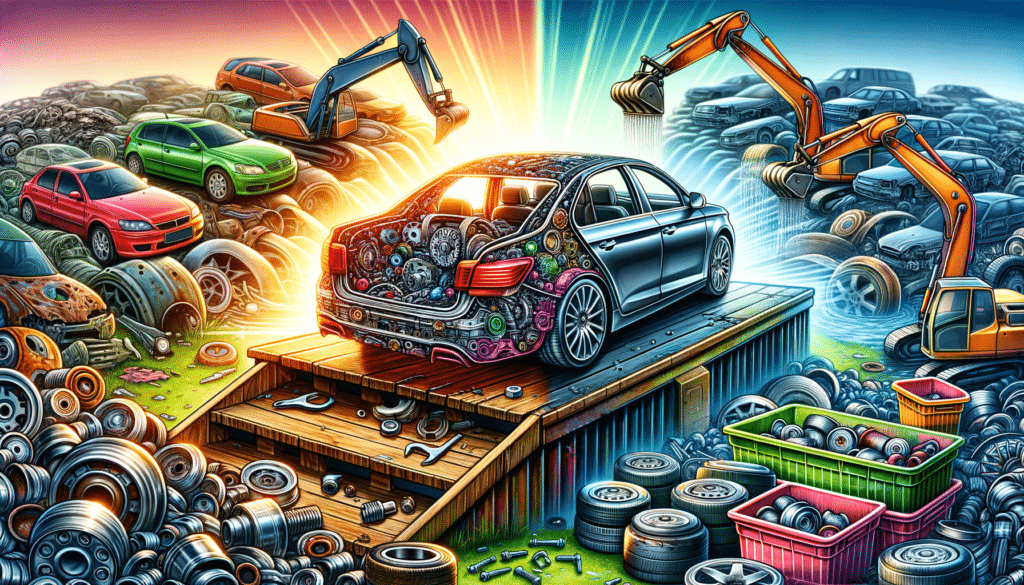Understanding the Concept of Junk Cars
Junk cars are vehicles that have exceeded their useful life due to age, damage, or mechanical issues. They are often considered more costly to repair than their current value. However, these vehicles can still hold significant worth in various forms. Understanding the potential value of junk cars involves recognizing their components, such as parts that can be resold, scrap metal, and sometimes, collectible status. The market for junk cars is driven by the demand for these components, making it a viable option for those looking to dispose of old vehicles.
Several factors contribute to a car being classified as a junk car. These include:
- Severe mechanical issues that are costly to repair.
- Extensive body damage from accidents or natural disasters.
- High mileage that reduces the car’s reliability.
- Outdated models that no longer attract buyers for regular use.
Understanding these elements can help car owners decide whether to sell their vehicles as junk cars or explore other options.
Options for Selling Junk Cars
When it comes to selling junk cars, owners have several options to consider, each with its own set of benefits and challenges. One popular method is selling to junkyards or scrap yards, where vehicles are dismantled for parts and metal. This option is straightforward and often provides immediate cash, but it may not always yield the highest financial return.
Another option is selling to specialized buyers who focus on refurbishing or reselling parts. This can be more profitable, especially if the car has rare or in-demand components. However, it requires more effort in finding the right buyer and negotiating the sale.
Online platforms have also become a viable avenue for selling junk cars. These platforms connect sellers with potential buyers nationwide, offering a broader market reach. The process is convenient and often involves free towing services, but sellers should be cautious of scams and ensure they deal with reputable buyers.
Evaluating the Worth of Junk Cars
Determining the value of a junk car requires assessing various factors, including the car’s make, model, age, and condition. The weight of the vehicle, which determines the amount of scrap metal it contains, is also a crucial factor. Cars with more metal are typically worth more in the scrap market.
Another aspect to consider is the value of usable parts. Some parts, like engines, transmissions, and catalytic converters, can be sold for a significant amount if they are in good condition. Additionally, certain cars may have collector’s value due to their rarity or historical significance, which can increase their worth despite being classified as junk.
To get an accurate evaluation, car owners can consult with multiple buyers or use online calculators that estimate the car’s value based on current market trends.
Environmental Considerations in Junk Car Disposal
Disposing of junk cars responsibly is crucial for minimizing environmental impact. Cars contain hazardous materials like oil, antifreeze, and battery acid, which can contaminate soil and water if not handled properly. Recycling parts and metal from junk cars reduces the need for new materials, conserving energy and resources.
Many junkyards and recycling centers adhere to environmental regulations, ensuring that harmful substances are disposed of safely. Car owners should prioritize working with such facilities to ensure that their junk cars are processed in an eco-friendly manner.
Additionally, some organizations offer incentives for recycling vehicles, such as tax deductions or cash rewards, encouraging more environmentally conscious disposal practices.
Conclusion: Making Informed Decisions with Junk Cars
Junk cars may seem like a burden, but they can offer unexpected value when managed wisely. By understanding the market, evaluating the car’s worth, and considering environmental impacts, owners can make informed decisions that benefit both their finances and the planet.
Exploring different selling options and choosing reputable buyers or recycling centers are key steps in maximizing the potential of junk cars. Whether selling for parts, scrap metal, or through online platforms, the right approach can turn a seemingly useless vehicle into a valuable asset.


